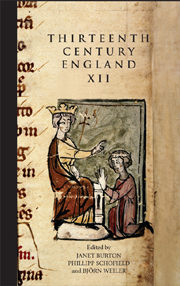Book contents
- Frontmatter
- Contents
- PREFACE
- LIST OF CONTRIBUTORS
- LIST OF ABBREVIATIONS
- The English and the Welsh in Fouke le Fitz Waryn
- Royal Piety in Thirteenth-century Scotland: The Religion and Religiosity of Alexander II (1214–49) and Alexander III (1249–86)
- The 1213 Pipe Roll and Exchequer Authority at the End of John's Reign
- The Public Debate during the Baronial Rebellion
- Richard of Cornwall and the Baronial Opposition in 1263
- Les liens personnels entre les cours de France et d'Angleterre sous le règne de Philippe III, 1270–85
- The Lay Opposition to Edward I in 1297: Its Composition and Character
- Peacekeepers and Lawbreakers in London, 1276–1321
- ‘The peace less kept’? The Origins, Revelations and Impact of Edward I's ‘Trailbaston’ Commissions of 1305–7
- Notes and Documents
- Knightly Society and the Augustinian Canons in the North-west of England
- A Year in the Life of a Royal Justice. Gilbert de Preston's Itinerary, July 1264–June 1265
- Living with Father's Reputation: The Careers of Two Thirteenth-century Oxfordshire Knights of Alien Origin, Thomas de Bréauté and Hugh de Plessis
- The Charters of Richard of Cornwall for the Empire
Living with Father's Reputation: The Careers of Two Thirteenth-century Oxfordshire Knights of Alien Origin, Thomas de Bréauté and Hugh de Plessis
from Notes and Documents
Published online by Cambridge University Press: 12 September 2012
- Frontmatter
- Contents
- PREFACE
- LIST OF CONTRIBUTORS
- LIST OF ABBREVIATIONS
- The English and the Welsh in Fouke le Fitz Waryn
- Royal Piety in Thirteenth-century Scotland: The Religion and Religiosity of Alexander II (1214–49) and Alexander III (1249–86)
- The 1213 Pipe Roll and Exchequer Authority at the End of John's Reign
- The Public Debate during the Baronial Rebellion
- Richard of Cornwall and the Baronial Opposition in 1263
- Les liens personnels entre les cours de France et d'Angleterre sous le règne de Philippe III, 1270–85
- The Lay Opposition to Edward I in 1297: Its Composition and Character
- Peacekeepers and Lawbreakers in London, 1276–1321
- ‘The peace less kept’? The Origins, Revelations and Impact of Edward I's ‘Trailbaston’ Commissions of 1305–7
- Notes and Documents
- Knightly Society and the Augustinian Canons in the North-west of England
- A Year in the Life of a Royal Justice. Gilbert de Preston's Itinerary, July 1264–June 1265
- Living with Father's Reputation: The Careers of Two Thirteenth-century Oxfordshire Knights of Alien Origin, Thomas de Bréauté and Hugh de Plessis
- The Charters of Richard of Cornwall for the Empire
Summary
In a much-quoted section of his Ecclesiastical History, Ordericus Vitalis criticised Henry I because ‘he ennobled others of base stock who had served him well, raised them, so to say, from the dust, and heaping all kinds of favours on them, stationed them above earls and famous castellans’. This phenomenon was not confined to the twelfth century. Both John and Henry III promoted obscure men, often aliens, to the highest ranks in their realms.
What happened to the children of these ‘new men’ when the high position their fathers achieved was not passed on in full? There is no obvious historiography that illuminates this issue and that of paternal reputation. For instance, although David Carpenter, Peter Coss, Anne Polden and Nigel Saul have written about the problems of maintaining knightly status, the examples in this paper are not exemplars to be used in a discussion of whether there was a crisis of the knightly class in the thirteenth century. The paper is about the legacy of the sons of men of comital rank who did not benefit from their father's achievements. The lives of Thomas de Bréauté and Hugh de Plessis, two relatively obscure thirteenth-century Oxfordshire knights, whose fathers had very remarkable careers, illustrate what could happen to such men. There are only a few possible comparators in the thirteenth century. Having had their pater familias killed at Evesham with one of his sons, the Montforts never regained the earldom of Leicester and the surviving sons died in exile.
- Type
- Chapter
- Information
- Thirteenth Century England XIIProceedings of the Gregynog Conference, 2007, pp. 167 - 182Publisher: Boydell & BrewerPrint publication year: 2009



